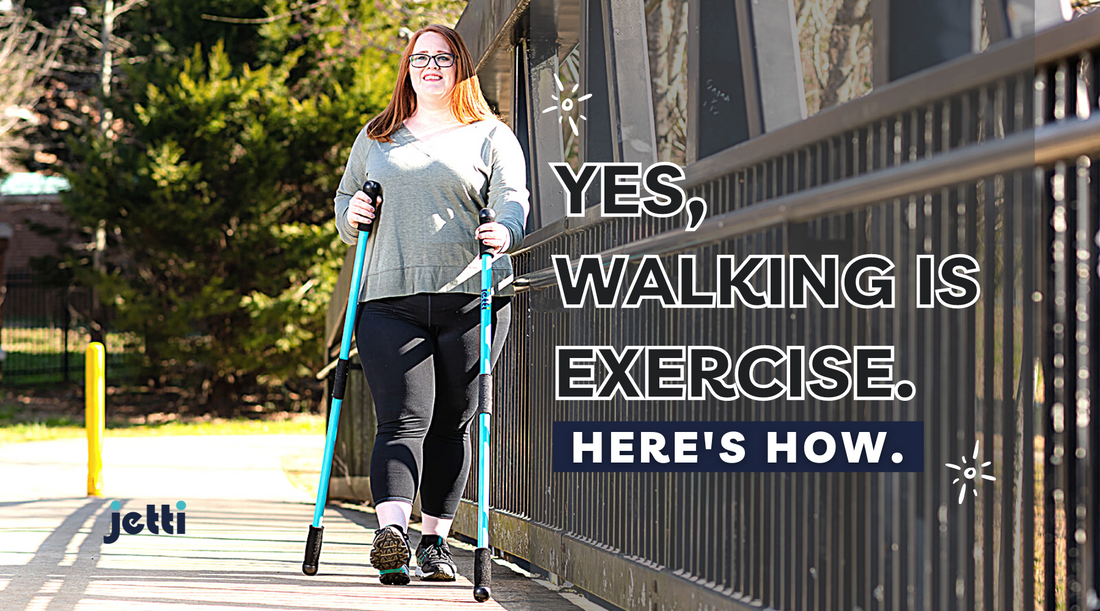You may think about walking as something you just do—the way to move from point A to point B. But walking is so much more. It is one of the most effective and accessible forms of exercise for your mind, body and spirit.
But is it exercise? Absolutely.
According to Merriam-Webster, exercise is “bodily exertion for the sake of developing and maintaining physical fitness.” So what’s physical fitness? The same source defines it as “good health and strength achieved through exercise.” Walking delivers all of these benefits and more.
Here’s how:
- The heart of the matter. Walking regularly, about 30 minutes a day 5 days a week at a moderate pace, can help improve your cardiovascular fitness. Which, in turn, can ward off coronary heart disease, even if you have a family history, or suffer from high blood pressure or obesity.
- The highs and lows. Because you control your own pace, walking allows you to train at intervals, easily switching between slower and faster speeds. Doing short bursts of a higher intensity pace gives your body the chance to achieve an anaerobic level—where your body is breaking down glucose without oxygen—allowing your heart and circulatory system to grow stronger. When you slow your pace down, you’ll find that your body will become more efficient at recovering from exercise. You may even find that interval training helps you lose weight more quickly than longer stints at one pace.
- Hey, sugar sugar. Taking a walk, especially after a meal, helps fire up your digestive system and lower your blood sugar. So, to help lower the risk of Type 2 diabetes, take a walk for about 30 minutes a day and it is okay to break that into three 10 minute walks following each meal.
- Breathe easy. Walking helps improve your lung function by giving your lungs a workout and teaching your body how to use oxygen efficiently. The result? You may find yourself breathing easier and going longer when you’re doing things other than walking.
- No caffeine or batteries required. Head out for a walk and take note of how you’re feeling once you’re done. You have more energy, don’t you? Yep, walking for exercise can decrease your fatigue and give you that burst of energy to get you through your day, without pouring yourself that second cup of coffee.
- Lower the pressure. A big benefit of exercise is how it can lower your blood pressure. Regular and consistent exercise, like walking, reduces high blood pressure and helps you sustain the benefits over time. It’s even found that shorter bursts of activity for women throughout the day—like a 3-10-minute walk multiple times a day—can help you maintain lower blood pressure throughout the day and into the days following.
- A smile says it all. There’s no doubt that exercise helps lift your spirits, and walking does just that. Walking reduces levels of the stress-hormone cortisol and increases the trifecta of happy hormones: endorphins, serotonin, and dopamine. A walk is a powerful, all-natural mood booster.
- Think a little clearer. Finding focus in a chaotic world is a tough feat, but taking a walk can help. The act of your feet hitting the ground stimulates blood flow, sending oxygen to your brain, resets your decision fatigue and activates your default network, all of which can boost your creativity and increase your focus. The increase in connectivity and coordination of important brain networks improves your cognitive function—your thinking skills.
- The Zs have it. There’s nothing like a good night’s sleep, and a regular walking practice will give you just that. Exercise has been shown to help you fall asleep more quickly and improve sleep quality. In fact, the research shows that 30 minutes of moderate aerobic exercise—like walking—can improve the quality of that night’s sleep.



